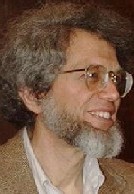Prof. Lawrence Wittner on the history of the nuclear disarmament movement, and how to engage today’s public in achieving nuclear abolition
Listen Now Download the show by right-clicking the link.
This week’s guest is Lawrence Wittner, Professor of History at the State University of New York/Albany. Prof. Wittner is an award-winning American historian who has written extensively on peace movements and foreign policy. He is the author of seven books, including his most recent: Confronting the Bomb: A Short History of the World Nuclear Disarmament Movement, published by Stanford University Press in 2009. He also wrote an earlier trilogy of books Toward Nuclear Abolition: The Struggle Against The Bomb upon which Confronting the Bomb is based. Prof. Wittner is a recipient of a John D. and Catherine T. MacArthur Foundation Program on Global Security and Sustainability Research Writing grant.
On this week’s program, Dr. Caldicott first asks Prof. Wittner how he came to write on the topic of the peace movement, and he says that disarmament activism has been the “greatest mass social movement of modern times.” He lays out in detail the three major upsurges of antinuclear activism around the world since the late 1940’s.

Prof. Lawrence Wittner
Prof. Wittner describes his findings about government response to antinuclear activism in various countries and at various points in the last 60 years. In many cases, the peace movement helped change government policies and was appreciated by politicians such as President John F. Kennedy. Prof. Wittner enunciates his point of view about whether or not peace activism has prevented nuclear war.
Dr. Caldicott asks about the mindset of those who continue to favor retaining, building or using nuclear weapons. Dr. Caldicott and Prof. Wittner explore spying and surveillance of peace groups, and
she describes her own experiences as a prominent leader of the antinuclear movement in the 1970’s and 1980’s.
Dr. Caldicott asks Wittner if the antinuclear movement in the U.S. is approaching a resurgence. In the discussion, they talk about some of the ways the public can become more involved in supporting nuclear abolition efforts, and they mention groups like Peace Action, Women’s Action for New Directions (formerly Women’s Action for Nuclear Disarmament) (WAND), Physicians for Social Responsibility (PSR) and Women’s International League for Peace and Freedom whose project Reaching Critical Will is all about nuclear disarmament. The groups Global Zero, Beyond Nuclear and The Nuclear Age Peace Foundation are also very actively working toward total disarmament.
Prof. Wittner says the 2010 conference on the Nuclear Non-Proliferation Treaty, which Obama has promised to reinvigorate, is a crucial event, and he says the U.S. Senate needs to feel pressure to pass the Comprehensive Test Ban Treaty.
Read Prof. Wittner’s articles How the Peace Movement Can Win, What the Peace Movement Can Learn from the NRA, and Have Peace Activists Ever Stopped a War?
Dr. Caldicott says that churches have a “moral obligation” to make eliminating all nuclear weapons a high priority. She is surprised that the mainstream media chose to ignore Prof. Wittner’s earlier books on the disarmament movement, which she says document crucial struggles to save all life on Earth. She encourages all listeners to buy a copy of Confronting the Bomb.

